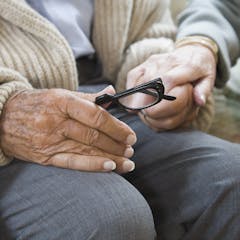
Articles on Palliative care
Displaying 1 - 20 of 85 articles

When dementia patients on Medicare enroll in hospice, they lose other crucial supports and services.

Patients with incurable cancer want to be informed about their disease and its treatment, but must also maintain hope. This inner conflict can affect how they process information about their prognosis.

It’s illegal to discuss voluntary assisted dying via telehealth, which means people who live in rural areas and those who can’t physically go to see a doctor may not be able to access the scheme.

One person said they wanted a VR experience that allowed them to explore Paris again.

All of us face loss and the reality of our own mortality. Whether through in-person discussion or over social media, let’s build communities that support people navigating death and dying.

Over 20% of people diagnosed with brain cancer survive longer than five years. But the NDIS may not recognise their need for support to live, work, learn and play.

An accurate prediction of survival can enable earlier conversations about preferences and wishes at the end of life, and earlier introduction of palliative care.

Palliative care is often seen as a ‘last resort’ rather than a service that empowers terminally ill people to live as well as possible for as long as possible.

Bill C-7 has created ethical tensions between MAID providers and palliative care, between transparency and patient privacy, and between offering a dignified death rather than a dignified life.

The challenging realities surrounding end-of-life care are especially difficult for older people experiencing homelessness, who have more barriers to accessing hospice care.

Gaps between health systems can mean NDIS participants at the end of their lives don’t have the support of their regular NDIS support workers.

For people to access medical assistance in dying (MAID) requires health-care professionals willing to provide the service. The reasons health-care providers choose not to participate are important.

Avoiding talk of death won’t make it disappear.

Palliative care, often misunderstood, is not synonymous with hospice care.

When you prepare to talk about end-of-life decisions and the legacy you want to leave behind, try thinking about them as gifts you bestow to family and friends.

Palliative care is about living well and meeting patients’ goals, but referral can be more complex than access to medical assistance in dying (MAID). Palliative care should be as accessible as MAID.

Evidence suggests messages the patient thought to be crystal clear often appear unclear to doctors and family.

Despite the disproportionate numbers of Aboriginal people in prisons, there are near to no cultural protocols in place, and chronic illness is often not addressed.

The case for letting people go gentle into that good night.

Death-friendly communities that welcome mortality might help us live better lives and provide better care for people at the end of their lives.





